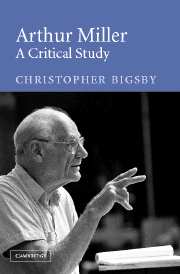Book contents
- Frontmatter
- Contents
- Acknowledgements
- Note on the text
- Introduction
- 1 The Michigan plays
- 2 The Golden Years, The Half-Bridge, Boro Hall Nocturne
- 3 The radio plays
- 4 The Man Who Had All the Luck
- 5 Focus
- 6 All My Sons
- 7 Death of a Salesman
- 8 Arthur Miller: time-traveller
- 9 An Enemy of the People
- 10 The Crucible
- 11 A Memory of Two Mondays
- 12 A View from the Bridge
- 13 Tragedy
- 14 The Misfits
- 15 After the Fall
- 16 Incident at Vichy
- 17 The Price
- 18 The Creation of the World and Other Business
- 19 The Archbishop's Ceiling
- 20 Playing for Time
- 21 The shearing point
- 22 The American Clock
- 23 The one-act plays: Two-Way Mirror, and Danger: Memory!
- 24 The Ride Down Mount Morgan
- 25 The Last Yankee
- 26 Broken Glass
- 27 Mr Peters' Connections
- 28 Resurrection Blues
- 29 Finishing the Picture
- 30 Fiction
- 31 Arthur Miller as a Jewish writer
- Notes
- Index
28 - Resurrection Blues
Published online by Cambridge University Press: 16 November 2009
- Frontmatter
- Contents
- Acknowledgements
- Note on the text
- Introduction
- 1 The Michigan plays
- 2 The Golden Years, The Half-Bridge, Boro Hall Nocturne
- 3 The radio plays
- 4 The Man Who Had All the Luck
- 5 Focus
- 6 All My Sons
- 7 Death of a Salesman
- 8 Arthur Miller: time-traveller
- 9 An Enemy of the People
- 10 The Crucible
- 11 A Memory of Two Mondays
- 12 A View from the Bridge
- 13 Tragedy
- 14 The Misfits
- 15 After the Fall
- 16 Incident at Vichy
- 17 The Price
- 18 The Creation of the World and Other Business
- 19 The Archbishop's Ceiling
- 20 Playing for Time
- 21 The shearing point
- 22 The American Clock
- 23 The one-act plays: Two-Way Mirror, and Danger: Memory!
- 24 The Ride Down Mount Morgan
- 25 The Last Yankee
- 26 Broken Glass
- 27 Mr Peters' Connections
- 28 Resurrection Blues
- 29 Finishing the Picture
- 30 Fiction
- 31 Arthur Miller as a Jewish writer
- Notes
- Index
Summary
By the time Miller came to write Resurrection Blues in 2002, something had changed. The old master stories that once offered to give a spine to existence could no longer be told. Marxism was dead and capitalism in embarrassing disarray, major corporations emerging as the corrupt dreams of corrupt men. The American century had ended; the turn of the millennium was fast disappearing in the rear-view mirror. What idea, what value, what purpose drove us now? What could be said to justify life to itself?
Very few of Arthur Miller's plays are without humour. That is, in part, the source of their authenticity. Even the most serious are laced, if not with wit, since few of his characters are conscious jokers, then with the kind of humour that comes from character, from misunderstandings, the discrepancy between thought and deed. As noted earlier, often his tactic seems to be to start his plays – as he does All My Sons and Death of a Salesman, The Price and Broken Glass – on a humorous note, the more effectively to create the growing feeling of desolation when that fades away. In The Creation of the World and Other Business and The American Clock, there is an alternating current of comedy and moral seriousness, and much the same could be said of Resurrection Blues, his first play of the new century.
- Type
- Chapter
- Information
- Arthur MillerA Critical Study, pp. 421 - 436Publisher: Cambridge University PressPrint publication year: 2004



